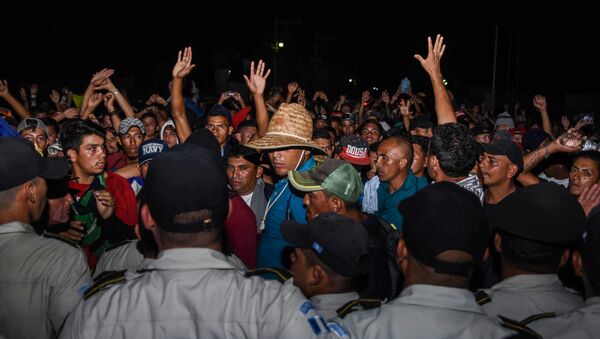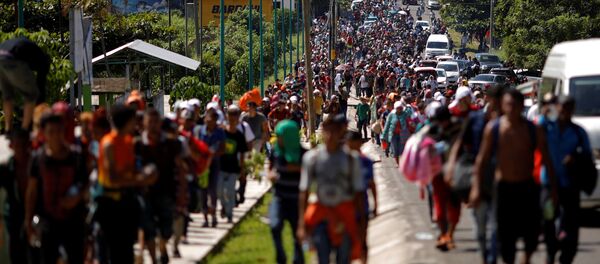Sputnik discussed solutions to avoid a possible crisis with Dan Cadman, a former US Immigration and Naturalization Service official, currently a Fellow with the Center for Immigration Studies.
Dan Cadman: I'm not sure that the crisis can be avoided. The crisis has been building for quite some time and even if one order take away the optics of seven or however many thousand people it is by the time it arrives, the daily huge drip of people crossing in to the US illegally on the southern border is at massive levels now. So, the crisis has been building and this just makes it visible.
Sputnik: It seems like you would want to cross the border a little less conspicuously. What can you say about this new tendency? We haven't seen it before, this massive group of people moving together. On the one hand, perhaps, this is a little bit less dangerous because there're a lot of dangerous territories that have to be crossed; there're criminal gangs and human traffickers that are certainly a risk factor. On the one hand, you see them getting more support from each other, but it seems that this is so conspicuous…
Dan Cadman: You make a good point, there is safety in numbers and that makes a huge difference particularly to the most vulnerable — women and children, who can be victimized along the way.
READ MORE: Political Crisis in Central America Prompts Migrant Caravan Moving Towards US
But if you think of it in a different context, think of the difference between a wave on a shore and a tsunami. With a wave on a shore you might have some beach erosion, you might have some problems; but if you have a tsunami, it overwhelms everything in its path and that is what is likely to happen with this group of people as they surge toward the border.
There aren't going to be enough border patrol agents to handle this; and that's why the President is now saying that he may very well call up the military and conceivably even order a closure of the entire southern border.
Sputnik: You are a former US Immigration and Naturalization Service official, can you tell us how policy has changed since the time you worked and under the Trump administration? Certainly there have been so many policy changes. It seems like there's an increase in agents already, and there's a decrease in migration.
When you have an immigration court system confirming a backlog of nearly three quarters of a million cases; those people aren't going to be detained, they're going to be released.
When they're released, they're going to disappear. If they stick around long enough, then, after a certain period of time, they're entitled to ask for work permits if they've sought asylum. The system works against itself; it's a clock whose mechanism has started to fall apart.
READ MORE: US Evaluating All Options on Migrant Caravan — Trump Administration Official
Sputnik: What do you think is the solution to this? Perhaps, there needs to be a better designed system of processing potential asylum seekers in their home countries?
Dan Cadman: That was done under the Obama administration, and the problem was that a great number of people either a) did not avail themselves of the opportunity, or b) were found by the asylum officers who were on site in those countries not truly to be legitimate asylum seekers but to be people who definitely lived oppressed and depressed lives, but those are lives based on grinding poverty and horrible economic circumstances and a broken social system.
Sputnik: What qualifies a person to be an asylum seeker in the US?
To give you an example, if you are a member of a tribe that was on the outs with the government or the press, that might be an example of a particular social group; it's not necessarily ethnic but it's something along the lines of a clan or a tribe. If that group is persecuted by the government that would be under that fifth ground that I mentioned.
Sputnik: Do you mean that survivors of natural disasters and political problems do not qualify?
Dan Cadman: No, although they can be granted temporary protected status; and in fact in the past the nationals of Honduras, El Salvador, Nicaragua, Haiti, and a number of other nationals from those countries did benefit from the temporary protected status as a consequence of acts of God — hurricanes, volcanoes or even in some instances some serious social upheaval and civil unrest.
Views and opinions expressed in this article are those of the speaker and do not necessarily reflect those of Sputnik.



